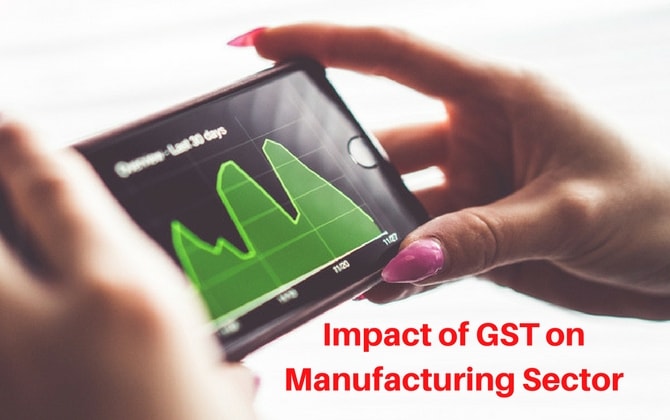
Impact of GST on Manufacturing Sector
Table of Contents:-
Nowadays, a lot of talks are going on relating to the migration of existing VAT, Service Tax, and Excise registrations into Online GST Registration. Let us understand what impact would GST (Goods and Service Tax Act) registration would be in the manufacturing sector.
In today’s globalized world, integrated economies synonymies with fast pace competition caused due to sophistication and technological up gradation witnessed by the various manufacturer, traders, and government.
Undoubtedly, the manufacturing sector is the heart of the country’s economy. Industrialization fostered the growth of manufacturing sector thereby improving the economic condition by cultivating self-sufficiency.
Before any product or service reaches to a consumer, it has to pass through numerous stages, and presently, different taxes such as Vat, CST, Excise duty and other tariff barriers were levied upon those commodities.
GST is the path-breaking initiative of the government to equalize the tax payment system for those who apply for same. The economy demanded reforms for tackling several issues prevailing therein. These indirect taxes do have an impact on the sector, as they influence the price in a significant manner and the consumer takes a buying decision by keeping the price of a particular commodity into mind.
Online GST Registration
In all likelihood, GST law will come into force from 1st July 2017, thereby redesigning the tax structure of the economy. The fundamental purpose of promoting GST is to foster economic growth and development in the economy by easing up the complicated tax structures so that they serve advantageously for both producers and consumers.
Although it has been formulated to provide immense benefits to both small and big manufacturers, its crucial aspects serving better for the economy can have adverse effects on the producers too. A unique GST identification is provided to every manufacturer who completes the process of Online GST Registration.
Impacts on the manufacturing sector
Positive Impacts
Single Tax Regime:
Under present tax structure, a manufacturer has to pay multiple taxes like VAT, service tax, Excise, Octroi, etc. This leads to increase in the cost of manufacturing and increase in prices of goods. GST regime aims to simplify the complications by introducing the single tax. Although GST itself is divided into three parts, its enforcement will improve the condition of manufactures and will also reduce the cost of production.
Reduction in Tax rate:
Presently, a manufacturer has to pay VAT @ 14%, Service Tax @ 15%, Excise @ 10% etc. The combined effect of all taxes is that approx.30 to 40% taxes need to be paid under the Indirect tax. This leads to increase in the cost of production, and the ultimate burden falls upon consumer regarding high price of products. GST serves as a boon in the eradication of such complications. With its introduction, costs of manufacture and consumption will reduce which will also provide relief to ultimate consumers.
Reduction in litigation
Presently, a lot of ambiguity remains as to whether the product will fall under goods or service and whether VAT will be applicable or Service tax will be applicable. This issue is completely resolved under the GST. As this tax is chargeable on “supply of goods or services” instead of the sale of goods or provision of service.
Reduction in documentation, compliance & Tax assessments
Under GST, there will be a reduction in documentation and compliance since instead of compliance with 3 -4 revenue department, the single department will be responsible for assessment and compliance. The current tax regime involves the participation of different tax assessment authorities for assessing various taxes. But the GST regime provides due relief by fixing the assessment authorities such as central authorities for CGST, state authorities for SGST and interstate authorities for IGST.
State wise registration
Under present structure, if a company has a different unit in one state, single VAT registration was required whereas, under proposed GST regime, separate registration would be needed for each entity even under the same state. Similarly, entity in different state would require different GST registration
Negative Impacts
No SSI Exemption
The current tax regime provided an SSI exemption to the manufacturer whose previous year turnover was up to 150 lakhs, however, under GST regime, the exemption value is reduced to 10 lakhs by the government.
Increases working capital requirements
Under the GST regime, the stock transfer has become taxable which will lead to blockage of capital and thereby an increase in the requirements of working capital.
Exclusion of petroleum products
Five petroleum products are excluded from the prospect of GST. Petroleum is an essential product that is required by most of the factories to facilitate production. This exclusion has a negative impact on the manufacturers.
Conclusion
The inception of modern GST regime is aimed at facilitating numerous benefits to manufacturers so as to encourage productive activities by them, thereby enhancing the economic condition of the country.
Although GST has some negative impact as well, however, on an overall basis, it will be a game changer for the Indian economy and may lead to increase in GDP by 1% to 1.5%. Necessary steps should be taken by the government to mitigate the negative impact or shortcomings to utilize full potential.
Accordingly, it is advisable to all the existing VAT Dealers and Service Providers to opt for the online process of GST migration & Online GST registration whereby they will be provided a unique identification code called GSTIN. This is also necessary to avail the benefit of credit on existing stock.


Would you mind if I included this content in my dataset? I want to make it clear that I’m gathering this data for my personal hobby as a data scientist, and citing the source is integral to my approach. Here my campus page at Kampus Terbaik Thanks! ID : CMT-E0FQJKTAU53KPIRVIQ
I wanted to thank you for this website! Thanks for sharing. Great websites! ! I can also refer you to one of the best Manufacturing Analytics.
a href=“ https://innodatatics.ai/services/manufacturing ”> Manufacturing Analytics
Very informative article, GST impacts on Streamlined processes, reduced complexities, and fostering growth. thank you for sharing the article